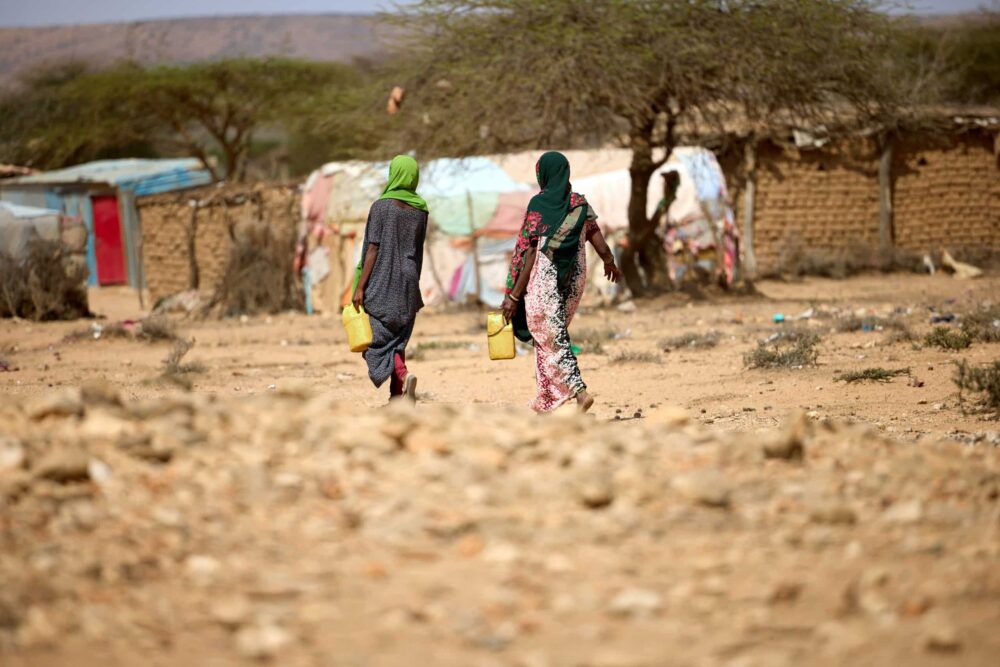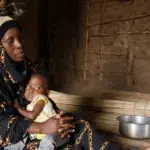Media Centre - Media release - 6 September 2022
Plan International statement as Somalia nears famine: “It should never have come to this.”

The UN’s humanitarian chief Martin Griffiths has said that famine will occur in October in parts of Somalia according to the latest food security and nutrition analysis.
In 2011, the last time a famine was declared in Somalia, 260,000 people lost their lives. Half of those who died were children under the age of five. This time, the death toll could be even worse. This year’s drought is more severe and is affecting more parts of the country than in 2011.
There are already an estimated 213,000 people classed as being at IPC level 5, meaning they face catastrophic hunger and starvation. This emergency is only likely to get even worse, with forecasts now predicting that October could bring an unprecedented fifth consecutive failed rainy season. Already, nearly 920,000 people have been forced to leave their homes in search of food and water.
Communities that Plan International work with say they are enduring the worst hunger they have experienced in their lifetimes.
Sadia Allin, Head of Mission for Plan International in Somalia and Somaliland said:
“It is devastating that we have reached the point where children in parts of Somalia are on the brink of famine. It should never have come to this. International action is needed more urgently than ever before. Children are already dying from hunger. Unless humanitarian aid is urgently and immediately stepped up, we face a situation where thousands more children will lose their lives needlessly and countless others will face other dangers and rights violations such as rape, violence and early marriage.
“As is so often the case, girls and young women will be the hardest hit by this crisis. When food is scarce, girls often eat less and they eat last. They are more likely than boys to be taken out of school to help find food, to face gender-based violence or to be married early to reduce the number of mouths their families need to feed.
“Nothing is more painful than for a mother to watch helplessly as her child is starving. We have met mothers who don’t have a single grain to feed their children and have resorted to boiling water so the child will think they have a meal. Others have married their daughters as young as 14 in exchange for help.
“We have been fearing this situation for months. We now have a very brief window of time to save as many lives as possible. We urgently need more support from donors so that we can reach more children, especially girls, and their families before it’s too late.”
Plan International Australia is calling for urgent support from the Australian Government in the form of a $150 million Famine Prevention Package to avert the worst impacts of this crisis and prevent the deaths of thousands of children.
It is feared that by the end of this year, 1.5 million Somalian children under the age of five (50% of Somali children) will be acutely malnourished, including 380,000 who are likely to be severely malnourished.
Women and children are bearing the brunt of this crisis, and together with elderly people account for nearly nine in 10 (87%) of those displaced by drought. Girls are also caught in a double crisis of hunger and violence in many places. In a recent Plan International needs assessment of 635 people in Somalia, girls and women interviewed said rape and other forms of sexual and gender-based violence were rising as food insecurity worsened. A third (34%) of people surveyed believe security risks – including rape, domestic violence, female genital mutilation (FGM) and child marriage – to girls and women have increased as a result of the drought.
One 13-year-old girl living in Somalia told Plan International that her biggest fear is being sent to the city to work or being married off in exchange for money: “Whenever I see a man speaking with my mother, I get scared thinking that I am the deal.”
Plan International has been responding to the drought across the Horn of Africa since the beginning of 2022 and a red alert for hunger in eight priority countries, including Somalia, is still active. We are working urgently to reach children, especially girls, in both Somaliland and Somalia with life-saving support and continue to scale up our programmes.
“Where is the shock, where is the outrage and most importantly where is the action,” said Plan International Australia CEO Susanne Legena.
“We are really at the tipping point for famine and if the world does not urgently step up life-saving humanitarian assistance, we are going to see a lot of death.”
[ENDS]
Notes to editors:
- A total of 635 people participated in the Plan International needs assessment in Somalia, including 330 women, 146 men, 95 girls, and 64 boys. 263 respondents were in Togdheer, 148 in Sool and 224 in Sanaag region. In Togdheer, more than half (54%) of respondents had crossed into the country from Ethiopia.
- We are working with local partners to reach children and their families in both Somaliland and Somalia with life-saving assistance, and have reached 44,250 people with emergency assistance to date.
- Together with our local partner TAAKULO, we are providing emergency water trucking and cash assistance using mobile money transfers so that families can purchase food and water, and access critical services such as health and education.
- Plan International is working in many of the countries bearing the brunt of this global food crisis. We are rapidly scaling up programmes such as cash and voucher assistance, food distributions, school meals, malnutrition screening and nutrition support. In South Sudan we are scaling up our food distributions in partnership with the World Food Programme, providing lifesaving supplementary feeding to pregnant and lactating mothers and children under five.
- Where possible across our food response programs we are providing cash or vouchers so families are able to buy food themselves so girls do not drop out of school to support families either by working or by looking after siblings. Where schools have closed, we are adapting and increasing school feeding programs so children are still able to eat when at home, allowing them more time to continue studying remotely where possible.
- We are scaling up protection mechanisms at the community level to respond to the increase in protection and child protection concerns and where we are distributing food directly, we are ensuring a protective environment for women and girls.
Media contacts


